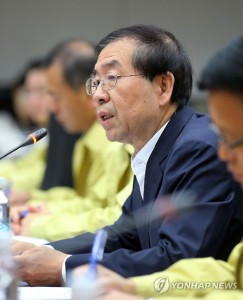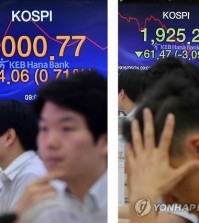- California Assembly OKs highest minimum wage in nation
- S. Korea unveils first graphic cigarette warnings
- US joins with South Korea, Japan in bid to deter North Korea
- LPGA golfer Chun In-gee finally back in action
- S. Korea won’t be top seed in final World Cup qualification round
- US men’s soccer misses 2nd straight Olympics
- US back on track in qualifying with 4-0 win over Guatemala
- High-intensity workout injuries spawn cottage industry
- CDC expands range of Zika mosquitoes into parts of Northeast
- Who knew? ‘The Walking Dead’ is helping families connect
S. Korea reports 4th death from MERS, with 5 new cases

Seoul City Mayor Park Won-soon speaks at an emergency meeting on June 5, 2015, on efforts to contain the Middle East Respiratory Syndrome (MERS) virus that has killed four South Koreans so far. Health officials confirmed that five more people have been infected with the virus, bringing the total to 41 as of June 5. (Yonhap)
SEOUL/SEJONG, June 5 (Yonhap) — South Korea reported its fourth death from the Middle East Respiratory Syndrome (MERS) on Friday and confirmed five new cases of the disease, bringing the total number of people diagnosed with the disease to 41.
According to the Ministry of Health and Welfare, a 76-year-old man died Thursday while undergoing treatment for the viral disease at a state-designated hospital.
The person, whose identity was not revealed for privacy reasons, was diagnosed on May 21 after coming in close contact with the country’s first-ever MERS patient, who reportedly caught the disease while traveling to the Middle East in mid-April.
With the latest death, the fatality rate of the disease in South Korea rose to 9.8 percent from around 5 percent.
MERS is a viral respiratory illness that had a very high fatality rate of over 40 percent globally before the outbreak in South Korea, according to the Korea Centers for Disease Control and Prevention.
Most people infected with MERS develop severe acute respiratory illness, including a fever, a cough and shortness of breath. There currently is no vaccine or treatment for the disease.
The lack of treatment for the disease is apparently adding to what many medical experts here have called groundless fears, despite a steady increase in the number of people diagnosed.
Such fears were again fueled Thursday when Seoul Mayor Park Won-soon accused a medical doctor from a Seoul hospital of attending a series of public gatherings on May 29-31, even after he was categorized as a suspected case and placed in isolation, possibly exposing nearly 1,600 people to the disease.
The doctor strongly rejected such accusations from Park and the city government, claiming he had not been placed in isolation when he attended the meetings last Friday and Saturday, and that he even voluntarily gave up attending a scheduled meeting Sunday after learning that he had been exposed to a MERS patient and that he could be developing symptoms of the disease.
Health Minister Moon Hyung-pyo also expressed regrets over what he called false and one-sided accusations.
“I deeply regret it that the Seoul city government has caused unnecessary public misunderstanding and concerns with its unilateral claims that made it look as if government measures to stop the spread of the disease are wrong,” he said at a press briefing Friday.
Moon, however, noted a significant number of people from the meetings attended by the doctor, who has since been diagnosed, could be subject to quarantine that may include isolation at their own homes.
Such a move comes as the country has already confirmed several cases of tertiary transmission of the disease.
Tertiary transmission of the disease means any person diagnosed with MERS can transmit the disease, making anyone who has come in close contact with any of the patients subject to quarantine.
The five new cases confirmed Friday were also believed to be tertiary transmission cases.
They included an Air Force chief master sergeant who was in the same hospital as the first MERS patient, but health ministry officials believe it was a case of tertiary transmission from another person who had contracted the MERS coronavirus from the first patient at the hospital.
Such speculation is based on the fact that the man began showing symptoms of MERS past the maximum known incubation period of 14 days for the disease since his last possible contact with the first patient on May 17, they noted.
Still, the case marked the first MERS case among members of the country’s military.
Previously, the government had only isolated some 100 people who had come in close contact with the first patient.
Since the first tertiary transmission case was confirmed Tuesday, the number had shot up to more than 1,600 as of Thursday.
The health ministry is conducting a DNA test of the MERS coronavirus to see whether there has been any mutation of the virus that could explain what it believes to be an unusually fast and wide spreading of the disease that had only affected 1,142 people in 23 countries since it was first reported in Saudi Arabia in 2012.
The outcome of the test was expected later Friday.
The ministry said a team of experts from the World Health Organization was set to visit the country, possibly next week, to check for any reasons for the spread of the disease in South Korea, which it said is showing different patterns and speed from the spread in Saudi Arabia, where more than 1,000 confirmed cases have been reported since 2012.
Despite repeated claims from the government that the disease is not out of control and appeals to the people to carry on with their daily lives, more than 1,160 schools, including some 400 kindergartens and a dozen colleges, have gone into a temporary shutdown out of fears over the disease.
















